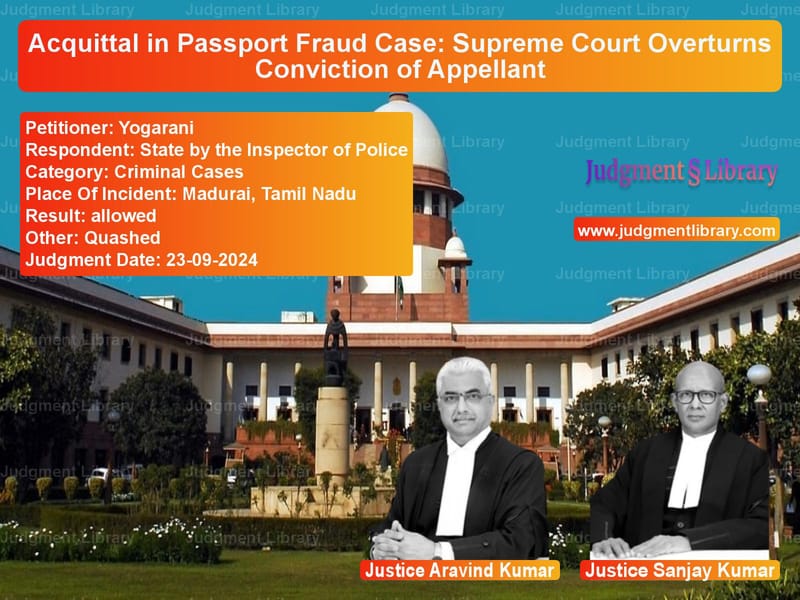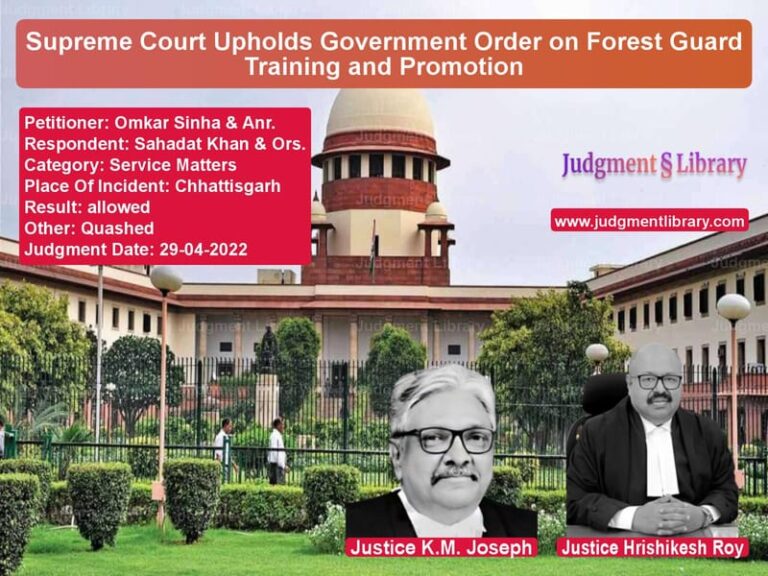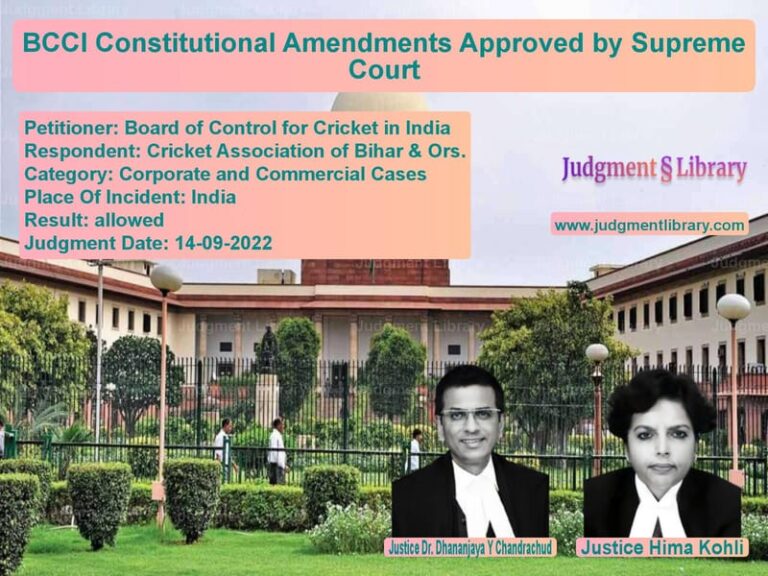Acquittal in Passport Fraud Case: Supreme Court Overturns Conviction of Appellant
The Supreme Court of India recently delivered a significant judgment in Yogarani v. State by the Inspector of Police, where the conviction of the appellant, Yogarani, was overturned. The appellant had been convicted for her role in facilitating the issuance of a second passport for accused No. 1, despite the fact that the individual already held a valid passport. This judgment is a critical development in the domain of criminal law related to fraud, public officials, and the handling of sensitive documents such as passports.
The case arose from an alleged conspiracy involving several accused individuals, including Yogarani, who facilitated the issuance of a second passport for an individual who had already secured a passport. The appellant’s conviction, based on Section 420 of the Indian Penal Code (IPC) and Section 12(2) of the Passports Act, was challenged in the Supreme Court. The judgment revolves around the principles of evidence, conspiracy, and the application of the law concerning fraud and the issuance of travel documents.
Background of the Case
The incident occurred when accused No. 1, Mr. J. Joseph, who had already secured an Indian passport, applied for a second passport, ostensibly for better employment opportunities. The application was routed through the appellant, Yogarani, who worked with a travel agency that facilitated passport applications. The second passport was issued in favor of accused No. 1. However, upon further investigation, it was discovered that the passport was returned undelivered to the Passport Office, and it was later handed over to the appellant by accused No. 3, who was in charge of the passport office’s safe custody.
The appellant allegedly demanded a payment of Rs. 5,000 from accused No. 1 for handing over the passport. The prosecution claimed that the appellant’s actions facilitated the illegal issuance and possession of a second passport, thus constituting fraud under the Indian Penal Code and the Passports Act.
Legal Proceedings and Arguments
Petitioner’s (Appellant) Arguments
- The appellant contended that her conviction was unsustainable for multiple reasons.
- She argued that accused Nos. 3 and 4, who were charged with similar offences, had been acquitted, and no appeal was filed against their acquittal.
- She further pointed out that accused No. 1, for whom the second passport was issued, had been acquitted, which weakened the entire prosecution’s case against her.
- The appellant’s defense emphasized that the testimony of PW-3 (the eyewitness) was unreliable and that there was no evidence to prove that she knowingly assisted in issuing a second passport for an individual already holding one.
- The appellant also argued that the handwriting expert’s opinion on the signature was inconclusive, making the conviction unsubstantiated.
Respondent’s (State) Arguments
- The prosecution argued that the appellant had facilitated the issuance of the second passport with knowledge of the fraud.
- The prosecution pointed to the evidence provided by the handwriting expert (PW-16), who claimed that there were similarities between the handwriting found on the postal cover and the appellant’s signature.
- The respondent further claimed that the appellant’s actions had contributed to the illegal activities surrounding the second passport and that her actions were in violation of the Passports Act and IPC.
Supreme Court’s Observations
Justice Aravind Kumar, delivering the judgment, observed:
“When there is similar or identical evidence of eyewitnesses against two accused by ascribing them the same or similar role, the Court cannot convict one accused and acquit the other. In such cases, the principles of parity must apply.”
The Court carefully examined the evidence presented, including the testimony of key witnesses and the forensic evidence. The Court noted several key points:
- The evidence provided by PW-3, an employee of the appellant’s travel agency, was not conclusive. PW-3 turned hostile during cross-examination and did not provide direct evidence implicating the appellant.
- The testimony of PW-15, the proprietor of Eagle Travels, was not reliable as there was no documentary evidence proving that the appellant had prior knowledge of accused No. 1’s existing passport.
- PW-16, the handwriting expert, admitted that it was not possible to express a definitive opinion regarding the handwriting on the returned postal cover, further weakening the prosecution’s case.
Key Findings and Judgment
- The Supreme Court held that the conviction of the appellant could not stand because the prosecution failed to establish the appellant’s knowledge of the fraud beyond reasonable doubt.
- It was noted that there was no direct evidence to prove that the appellant had knowingly facilitated the issuance of a second passport for accused No. 1, who was already holding an Indian passport.
- The Court emphasized that the acquittal of accused Nos. 3 and 4, who were charged with similar offences, rendered the conviction of the appellant untenable, as there was no clear distinction in the evidence against them.
- The appellant’s conviction was quashed, and she was acquitted of all charges.
Implications of the Judgment
This ruling has significant implications for the prosecution of cases involving fraudulent passport applications:
- Principle of Parity: The Supreme Court reiterated the principle of parity, asserting that similar evidence should lead to similar outcomes in cases involving multiple accused individuals.
- Need for Reliable Evidence: The ruling highlights the need for strong and corroborated evidence, especially when relying on circumstantial evidence or testimony from expert witnesses like handwriting experts.
- Burden of Proof in Criminal Cases: The judgment reaffirms that the burden of proof in criminal cases lies on the prosecution, and an accused must be acquitted if there is reasonable doubt about their involvement in the crime.
Conclusion
The Supreme Court’s judgment in Yogarani v. State by the Inspector of Police is a significant ruling that reinforces the importance of procedural fairness and the presumption of innocence in criminal law. By acquitting the appellant, the Court ensured that justice was served, highlighting the need for reliable evidence and the application of established legal principles in criminal cases.
Petitioner Name: Yogarani.Respondent Name: State by the Inspector of Police.Judgment By: Justice Aravind Kumar, Justice Sanjay Kumar.Place Of Incident: Madurai, Tamil Nadu.Judgment Date: 23-09-2024.
Don’t miss out on the full details! Download the complete judgment in PDF format below and gain valuable insights instantly!
Download Judgment: yogarani-vs-state-by-the-inspect-supreme-court-of-india-judgment-dated-23-09-2024.pdf
Directly Download Judgment: Directly download this Judgment
See all petitions in Fraud and Forgery
See all petitions in Bail and Anticipatory Bail
See all petitions in Theft and Robbery Cases
See all petitions in Public Sector Employees
See all petitions in Judgment by Aravind Kumar
See all petitions in Judgment by Sanjay Kumar
See all petitions in allowed
See all petitions in Quashed
See all petitions in supreme court of India judgments September 2024
See all petitions in 2024 judgments
See all posts in Criminal Cases Category
See all allowed petitions in Criminal Cases Category
See all Dismissed petitions in Criminal Cases Category
See all partially allowed petitions in Criminal Cases Category







